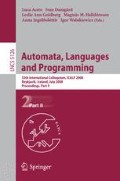Abstract
We propose a new cryptographic primitive, called extractable perfectly one-way (EPOW) functions. Like perfectly one-way (POW) functions, EPOW functions are probabilistic functions that reveal no information about their input, other than the ability to verify guesses. In addition, an EPOW function, f, guarantees that any party that manages to compute a value in the range of f “knows” a corresponding preimage.
We capture “knowledge of preimage” by way of algorithmic extraction. We formulate two main variants of extractability, namely non-interactive and interactive. The noninteractive variant (i.e., the variant that requires non-interactive extraction) can be regarded as a generalization from specific knowledge assumptions to a notion that is formulated in general computational terms. Indeed, we show how to realize it under several different assumptions. The interactive- extraction variant can be realized from certain POW functions.
We demonstrate the usefulness of the new primitive in two quite different settings. First, we show how EPOW functions can be used to capture, in the standard model, the “knowledge of queries” property that is so useful in the Random Oracle (RO) model. Specifically, we show how to convert a class of CCA2-secure encryption schemes in the RO model to concrete ones by simply replacing the Random Oracle with an EPOW function, without much change in the logic of the original proof. Second, we show how EPOW functions can be used to construct 3-round ZK arguments of knowledge and membership, using weaker knowledge assumptions than the corresponding results due to Hada and Tanaka (Crypto 1998) and Lepinski (M.S. Thesis, 2004). This also opens the door for constructing 3-round ZK arguments based on other assumptions.
Access this chapter
Tax calculation will be finalised at checkout
Purchases are for personal use only
Preview
Unable to display preview. Download preview PDF.
References
Barak, B., Goldreich, O., Impagliazzo, R., Rudich, S., Sahai, A., Vadhan, S., Yang, K.: On the (im)possibility of obfuscating programs. In: Kilian, J. (ed.) CRYPTO 2001. LNCS, vol. 2139. Springer, Heidelberg (2001)
Barak, B., Ong, S., Vadhan, S.: Derandomization in cryptography. In: Galbraith, S.D. (ed.) Cryptography and Coding 2007. LNCS, vol. 4887. Springer, Heidelberg (2007)
Bellare, M., Palacio, A.: The knowledge-of-exponent assumptions and 3-round zero-knowledge protocols. In: Franklin, M. (ed.) CRYPTO 2004. LNCS, vol. 3152. Springer, Heidelberg (2004)
Bellare, M., Rogaway, P.: Random oracles are practical:a paradigm for designing efficient protocols. In: CCS 1993 (1993)
Blum, M.: How to prove a theorem so no one else can claim it. In: Proceedings of the International Congress of Mathematicians (1986)
Boldyreva, A., Fischlin, M.: On the security of OAEP. In: Lai, X., Chen, K. (eds.) ASIACRYPT 2006. LNCS, vol. 4284. Springer, Heidelberg (2006)
Canetti, R.: Towards realizing random oracles:hash functions that hide all partial information. In: Kaliski Jr., B.S. (ed.) CRYPTO 1997. LNCS, vol. 1294. Springer, Heidelberg (1997)
Canetti, R., Dakdouk, R.R.: Extractable perfectly one-way functions. eprint (2008)
Canetti, R., Goldreich, O., Halevi, S.: The random oracle methodology, revisited. In: STOIC 1998 (1998)
Canetti, R., Micciancio, D., Reingold, O.: Perfectly one-way probabilistic hash functions. In: STOIC 1998 (1998)
Cramer, R., Damgard, I., Nielsen, J.B.: Multiparty computation from threshold homomorphic encryption. In: Pfitzmann, B. (ed.) EUROCRYPT 2001. LNCS, vol. 2045. Springer, Heidelberg (2001)
Damgard, I.: Towards practical public key systems secure against chosen ciphertext attacks. In: Crypto 1992 (1992)
Dent, A.: The cramer-shoup encryption scheme is plaintext aware in the standard model. In: Vaudenay, S. (ed.) EUROCRYPT 2006. LNCS, vol. 4004. Springer, Heidelberg (2006)
Dolev, D., Dwork, C., Naor, M.: Nonmalleable cryptography. SIAM Journal on Computing 30 (2000)
Fiat, A., Shamir, A.: How to prove yourself:practical solutions to identification and signature problems. In: Crypto 1986 (1986)
Federal Information Processing Standard (FIPS). Secure hash standard. NIST, FIPS publication 180 (1993)
Goldwasser, S., Kalai, Y.T.: On the (in)security of the fiat-shamir paradigm. In: FOCS 2003 (2003)
Goldwasser, S., Kalai, Y.T.: On the impossibility of obfuscation with auxiliary input. In: FOCS 2005 (2005)
Groth, J., Ostrovsky, R., Sahai, A.: Non-interactive zaps and new techniques for NIZK. In: Dwork, C. (ed.) CRYPTO 2006. LNCS, vol. 4117. Springer, Heidelberg (2006)
Hada, S., Tanaka, T.: On the existence of 3-round zero-knowledge protocols. In: Krawczyk, H. (ed.) CRYPTO 1998. LNCS, vol. 1462. Springer, Heidelberg (1998)
Hada, S., Tanaka, T.: On the existence of 3-round zero-knowledge protocols (eprint) (1999)
Katz, J.: Efficient and non-malleable proofs of plaintext knowledge and applications. In: Eurocrypt 2003 (2003)
Lepinski, M.: On the existence of 3-round zero-knowledge proofs. M.S. Thesis (2002)
Maurer, U., Renner, R., Holenstein, C.: Indifferentiability, impossibility results on reductions, and applications to the random oracle methodology. In: Naor, M. (ed.) TCC 2004. LNCS, vol. 2951. Springer, Heidelberg (2004)
Nielsen, J.: Separating random oracle proofs from complexity theoretic proofs:the non-committing encryption case. In: Yung, M. (ed.) CRYPTO 2002. LNCS, vol. 2442. Springer, Heidelberg (2002)
Rivest, R.: The MD5 message-digest algorithm. IETF Network Working Group, RFC 1321 (1992)
Sahai, A.: Non-malleable non-interactive zero knowledge and adaptive chosen-ciphertext security. In: FOCS 1999 (1999)
De Santis, A., Di Crescenzo, G., Ostrovsky, R., Persiano, G., Sahai, A.: Robust non-interactive zero knowledge. In: Kilian, J. (ed.) CRYPTO 2001. LNCS, vol. 2139. Springer, Heidelberg (2001)
De Santis, A., Persiano, G.: Zero knowledge proofs of knowledge without interaction. In: FOCS 1992 (1992)
Wee, H.: On obfuscating point functions. In: STOIC 2005 (2005)
Author information
Authors and Affiliations
Editor information
Rights and permissions
Copyright information
© 2008 Springer-Verlag Berlin Heidelberg
About this paper
Cite this paper
Canetti, R., Dakdouk, R.R. (2008). Extractable Perfectly One-Way Functions. In: Aceto, L., Damgård, I., Goldberg, L.A., Halldórsson, M.M., Ingólfsdóttir, A., Walukiewicz, I. (eds) Automata, Languages and Programming. ICALP 2008. Lecture Notes in Computer Science, vol 5126. Springer, Berlin, Heidelberg. https://doi.org/10.1007/978-3-540-70583-3_37
Download citation
DOI: https://doi.org/10.1007/978-3-540-70583-3_37
Publisher Name: Springer, Berlin, Heidelberg
Print ISBN: 978-3-540-70582-6
Online ISBN: 978-3-540-70583-3
eBook Packages: Computer ScienceComputer Science (R0)

